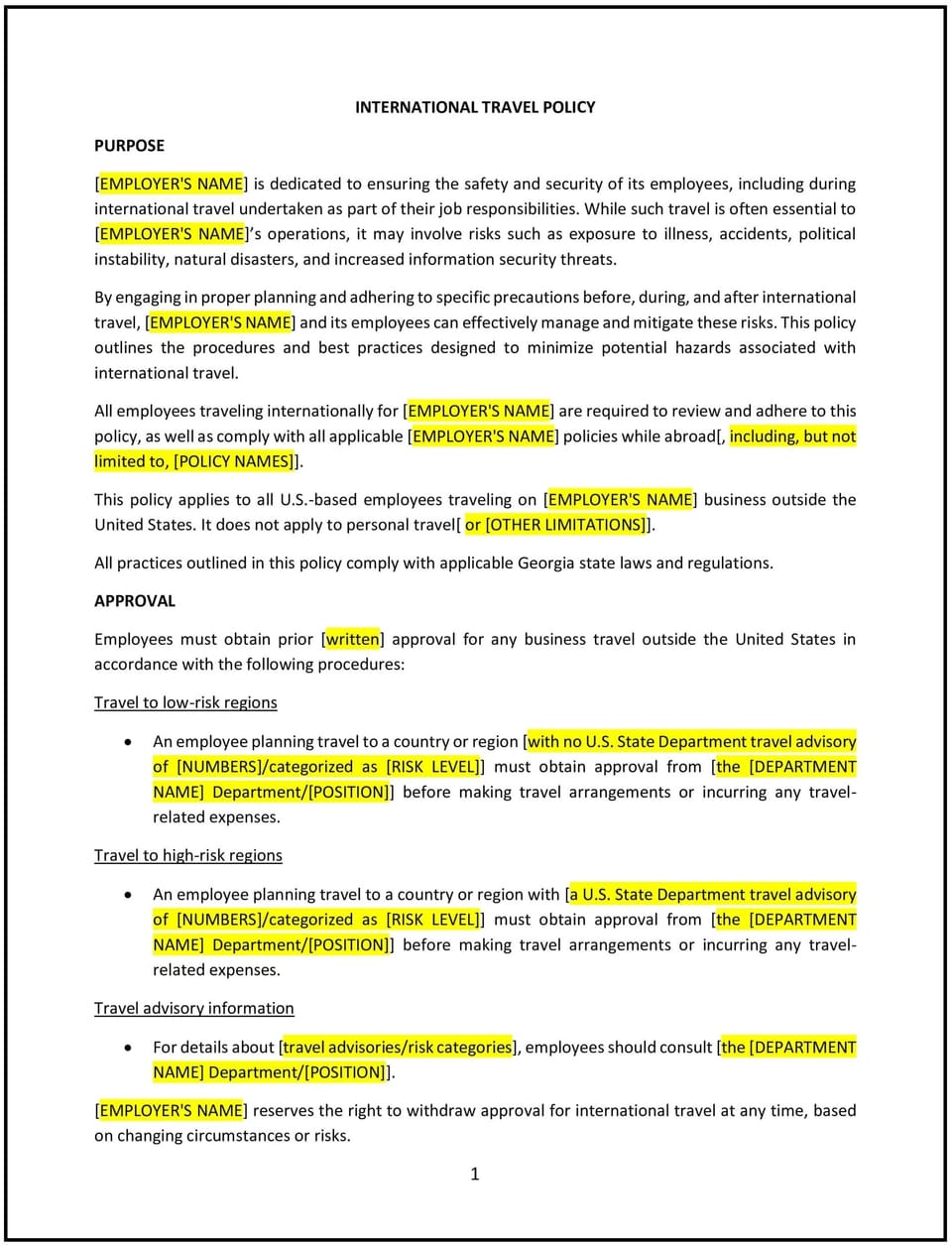International travel policy (Georgia): Free template

International travel policy (Georgia)
This international travel policy is designed to help Georgia businesses manage and support employee travel abroad for business purposes. The policy outlines travel approval procedures, expense guidelines, and safety measures to ensure efficient and secure international travel.
By implementing this policy, businesses can streamline travel planning, enhance safety, and ensure employees represent the company professionally while abroad.
How to use this international travel policy (Georgia)
- Define travel purposes: Specify the types of business activities eligible for international travel, such as attending conferences, client meetings, or training sessions.
- Outline approval procedures: Require employees to obtain travel approval from designated managers or HR by submitting detailed travel plans, including dates, destinations, and objectives.
- Provide expense guidelines: Establish clear rules for reimbursable expenses, such as airfare, lodging, meals, transportation, and incidental costs.
- Address documentation requirements: Require employees to ensure passports, visas, and other necessary travel documents are valid and in order.
- Include safety protocols: Emphasize safety measures, such as registering with the U.S. embassy, carrying emergency contact information, and adhering to local laws and customs.
- Offer pre-travel support: Provide resources, such as destination-specific travel advisories, health recommendations, and cultural etiquette guidance.
- Monitor travel activities: Maintain communication with traveling employees and provide support during emergencies or disruptions.
- Review and update regularly: Periodically assess the policy to reflect changes in travel risks, global conditions, or Georgia business needs.
Benefits of using this international travel policy (Georgia)
Implementing this policy provides several advantages for Georgia businesses:
- Enhances efficiency: Clear guidelines streamline the travel approval and planning process.
- Reduces costs: Expense rules help manage travel budgets and avoid unnecessary spending.
- Improves safety: Travel protocols and pre-trip support minimize risks for employees traveling abroad.
- Promotes professionalism: Employees are better prepared to represent the company effectively in international settings.
- Reflects Georgia-specific needs: Tailoring the policy to local business practices and industries ensures its relevance and practicality.
Tips for using this international travel policy (Georgia)
- Communicate expense limits: Clearly inform employees about spending caps and categories of reimbursable expenses.
- Provide travel training: Offer sessions on travel safety, expense reporting, and cultural awareness to prepare employees for international trips.
- Use technology: Implement travel management software to streamline approvals, bookings, and expense tracking.
- Encourage feedback: Ask employees to share their travel experiences to improve the policy and support resources.
- Plan for emergencies: Develop contingency plans for travel disruptions, such as canceled flights or health emergencies.
Q: What types of business activities qualify for international travel?
A: Activities such as attending client meetings, industry conferences, trade shows, or training sessions typically qualify for international travel.
Q: How should employees request approval for international travel?
A: Employees should submit a travel request, including the purpose, dates, and estimated costs, to their manager or HR for approval.
Q: What expenses are reimbursable under this policy?
A: Reimbursable expenses may include airfare, accommodations, meals, local transportation, and necessary incidentals, as outlined in the policy.
Q: How can employees prepare for international travel?
A: Employees should ensure their passports and visas are valid, review destination-specific safety guidelines, and familiarize themselves with local laws and customs.
Q: What should employees do in case of an emergency abroad?
A: Employees should contact their manager or designated company representative immediately and seek assistance from local authorities or the nearest U.S. embassy.
Q: How are expenses reimbursed after a trip?
A: Employees should submit itemized receipts and a completed expense report to HR or the finance department for reimbursement.
Q: How often should this policy be reviewed?
A: The policy should be reviewed annually or as needed to address changes in global travel conditions or business priorities.
This article contains general legal information and does not contain legal advice. Cobrief is not a law firm or a substitute for an attorney or law firm. The law is complex and changes often. For legal advice, please ask a lawyer.


